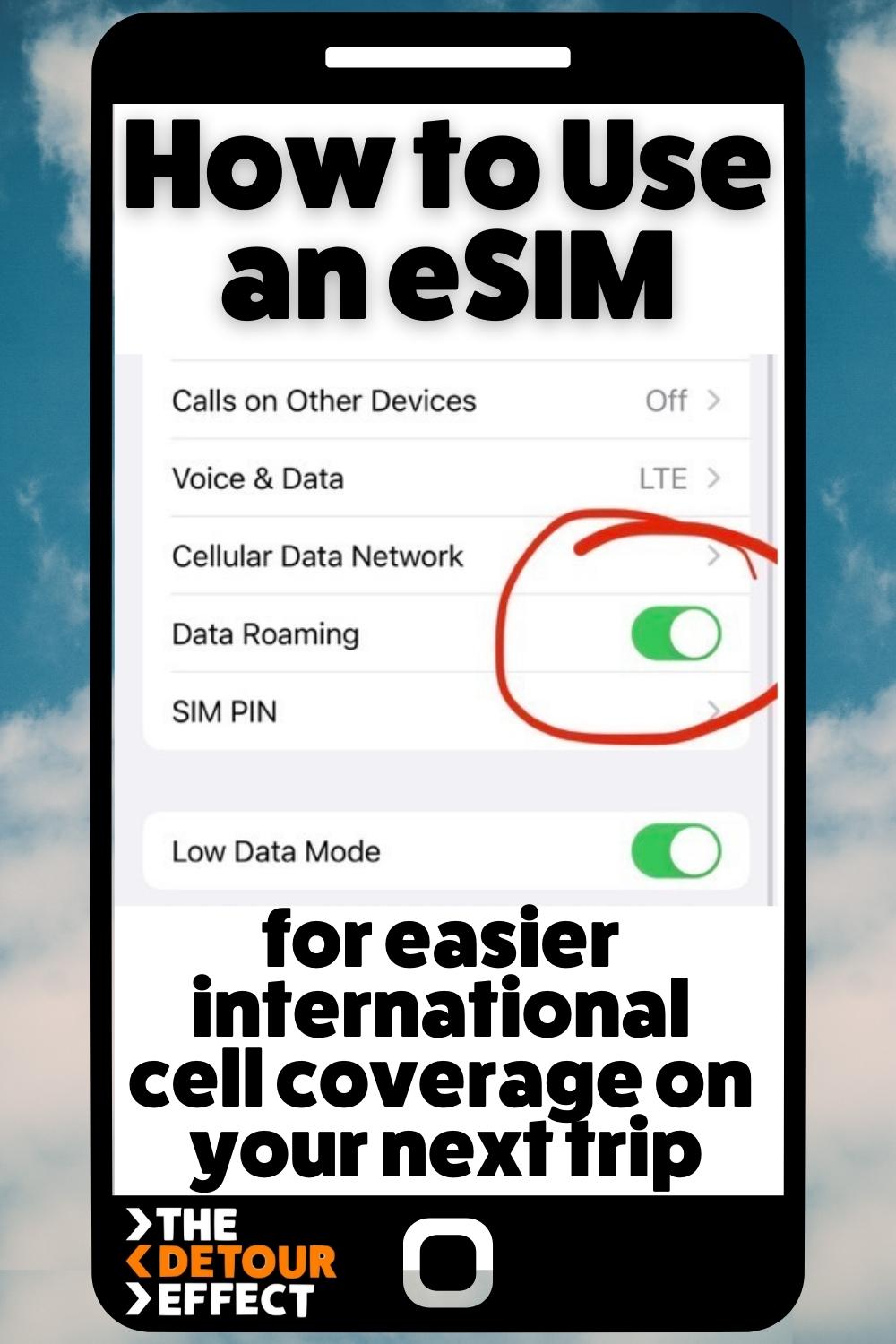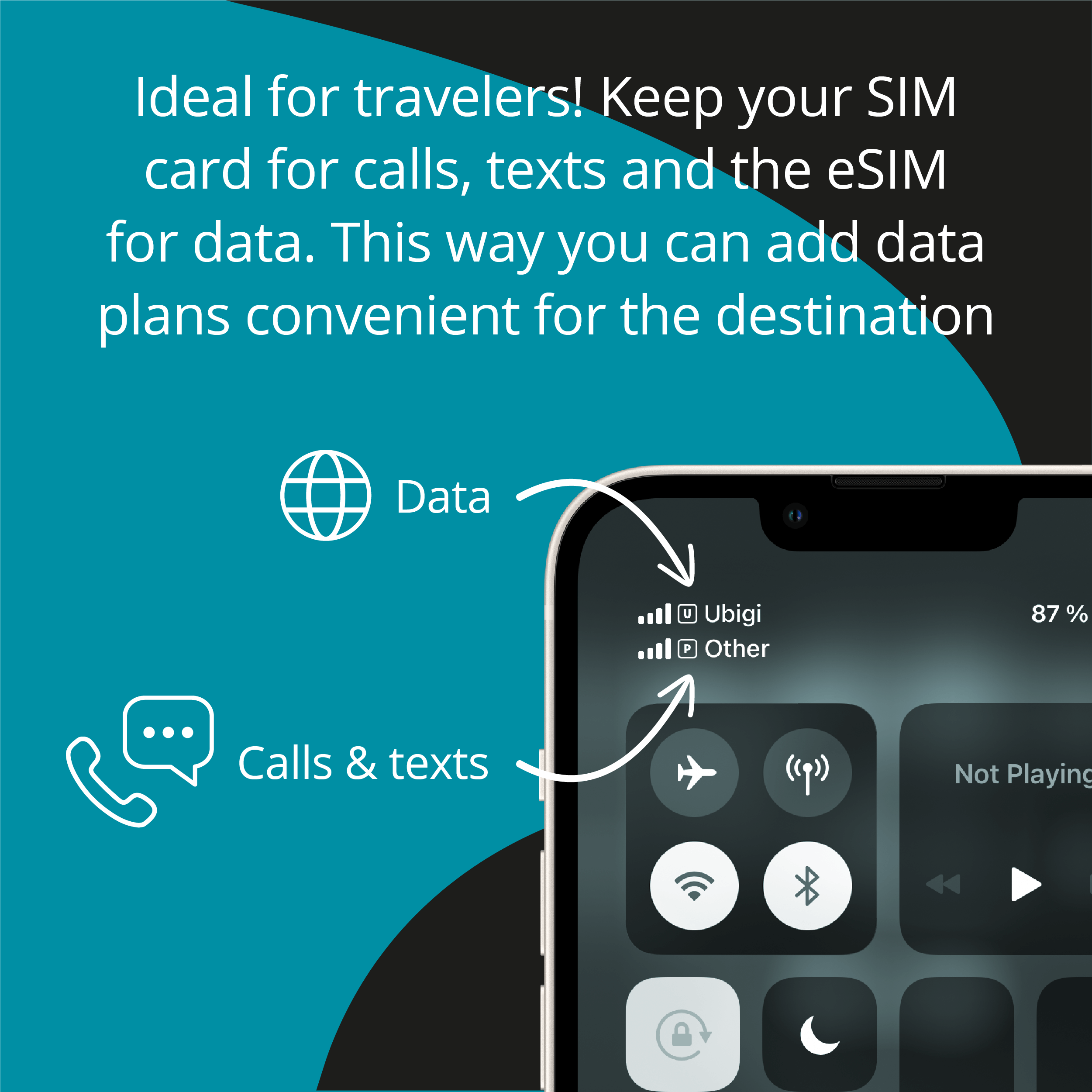Yes, you can make phone calls with eSIM technology. ESIM allows you to make and receive calls, just like a regular SIM card.
It’s a built-in feature on modern smartphones, providing the capability to connect to the cellular network and make phone calls using the eSIM profile. ESIM, or embedded SIM, is a virtual SIM card that is built into a device, eliminating the need for a physical SIM card.
With eSIM, users can easily switch between different mobile carriers without needing to physically swap SIM cards. This technology has gained popularity for its convenience and flexibility, especially for frequent travelers or individuals who require multiple phone numbers. In addition to phone calls, eSIM also enables users to send and receive text messages and access mobile data services. As more mobile carriers and smartphone manufacturers adopt eSIM technology, it is becoming an increasingly common method for managing cellular connectivity.

Credit: thedetoureffect.com
What Is Esim?
Electronic SIM, or eSIM, is a revolutionary technology that is turning heads in the mobile industry. Unlike the traditional SIM cards we’ve been accustomed to, eSIM is embedded directly into your device, eliminating the need for a physical SIM card.
How Does Esim Work?
eSIM works by utilizing a chip that is integrated into your smartphone, tablet, or wearable device. This chip securely stores all the necessary information that is typically found on a physical SIM card, such as your mobile carrier’s details and your phone number.
When activating your device with an eSIM, the device manufacturer or your mobile carrier will remotely provision the necessary data onto the eSIM chip. This process is often seamless and can be done without any physical interaction.
Advantages Of Esim
eSIM presents several advantages over traditional physical SIM cards. Let’s take a closer look at some of these advantages:
- Convenience: With eSIM, you can easily switch between mobile carriers without needing to physically swap SIM cards. This means no more fumbling with tiny pieces of plastic every time you want to change carriers.
- Flexibility: eSIM allows you to have multiple phone numbers on a single device. This is particularly useful for those who have separate personal and business numbers, or for frequent travelers who want to use local phone numbers while abroad.
- More Space: By eliminating the need for a physical SIM card slot, eSIM frees up valuable real estate within your device. This extra space can be utilized for other components or simply results in a slimmer and more compact design.
- Remote Activation: With eSIM, you can activate your device remotely without needing to visit a physical store or wait for a SIM card to be delivered.
As eSIM technology continues to gain momentum and support from mobile carriers worldwide, more and more devices are being equipped with this innovative feature. So, if you’re eager to enjoy the benefits of eSIM, make sure you check with your mobile carrier and device manufacturer to see if your device supports this exciting technology!

Credit: cellulardata.ubigi.com
Esim In Mobile Phones
eSIM in Mobile Phones: The integration of eSIM technology in mobile phones has revolutionized the way we connect and communicate. eSIM, or embedded SIM, allows users to make phone calls without a physical SIM card.
Integration Of Esim In Mobile Phones:
eSIM is seamlessly integrated into modern mobile phones, eliminating the need for a traditional SIM card slot. This compact chip stores all necessary information for activating phone services.
Compatibility with Esim:
eSIM technology is compatible with a wide range of mobile devices, ensuring a smooth transition for users. Many phone manufacturers have adopted eSIM support, offering versatility and convenience.
Also Read: How Long Can Police Hold Your Phone
Making Phone Calls with Esim
Discovering the convenience of utilizing eSIM for making phone calls opens up a world of flexibility and efficiency. With the rising adoption of eSIM technology, understanding how to set it up and effectively use it for voice calls is crucial for seamless communication.
Setting up Esim for Calls
To begin making phone calls with eSIM, you first need to set up the eSIM on your device. This involves contacting your service provider and obtaining the eSIM activation QR code. Then, navigate to the eSIM settings on your device and scan the QR code to establish the connection.
Using Esim for Voice Calls
Once your eSIM is successfully set up, you can start using it for voice calls. Simply dial the desired number as you would with a physical SIM card, and the call will be connected through the eSIM. Ensure that your device supports eSIM functionality and has adequate network coverage for clear and uninterrupted calls.
See Also: How to Find Phone Number by Telegram Id
Carrier Support for Esim Calls
Discover how carriers provide support for eSIM calls and find out if you can make phone calls using an eSIM. Explore the convenience and flexibility of this advanced technology in the world of communication.
Carrier Support for eSIM CallsMajor Carriers Offering eSIM SupportIf you’re considering using an eSIM for your phone calls, it’s important to know which carriers are on board with this new technology. Fortunately, several major carriers around the world now offer support for eSIM calls.Here’s a list of some of the leading carriers that have embraced this modern communication feature:– AT&T: AT&T is one of the pioneers when it comes to eSIM support. They provide eSIM call plans for both postpaid and prepaid customers, allowing you to make hassle-free phone calls with your eSIM.– Verizon: Verizon, another prominent carrier in the United States, has also jumped on the eSIM bandwagon. With their eSIM call plans, you can seamlessly make calls using your phone’s eSIM, without the need for a physical SIM card.– T-Mobile: T-Mobile offers eSIM support, making it convenient for their customers to enjoy the benefits of eSIM technology. By adopting their eSIM call plans, you can easily switch between carriers or add a secondary line without dealing with physical SIM cards.– Vodafone: As one of the largest telecommunications companies globally, Vodafone is committed to delivering cutting-edge technology to its customers. Their eSIM call plans allow you to make and receive phone calls using your eSIM-enabled device with ease.– EE: In the United Kingdom, EE stands out as a leading provider offering eSIM support. With EE’s eSIM call plans, you can take advantage of their extensive network coverage and enjoy the convenience of using an eSIM for your phone calls.eSIM Call PlansWith eSIM technology gaining momentum, carriers have started offering various eSIM call plans to cater to different needs and preferences. These plans often come with different price points, features, and data allowances. To help you make an informed decision, it’s important to understand the available options.Here are some key considerations when exploring eSIM call plans:– Cost: Compare the pricing of different eSIM call plans to find one that fits your budget. Some carriers offer affordable options, while others provide premium packages with additional perks.– Data Allowance: Assess your data usage patterns and select an eSIM plan that offers enough data for your needs. Whether you’re a light user or someone who relies heavily on data for calls, texts, and internet browsing, choose a plan with an appropriate data allowance.– International Roaming: If you frequently travel internationally, opt for an eSIM call plan that includes international roaming. This way, you can make and receive calls without exorbitant roaming charges.– Flexibility: Look for plans that offer flexibility by allowing you to switch carriers or add a secondary line easily. This freedom ensures you can adapt your phone service to your changing needs without any hassle.By considering these factors, you can find an eSIM call plan that aligns perfectly with your communication requirements.In conclusion, as eSIM technology continues to evolve, many major carriers are embracing this innovative way to make phone calls. With their support and diverse eSIM call plans, you can enjoy the convenience and flexibility of using an eSIM for your communication needs.Challenges and Limitations
The use of eSIM technology has brought about a significant shift in the way we use mobile devices. While eSIM offers many advantages such as easy activation and enhanced device flexibility, it also poses challenges and limitations, especially when it comes to making phone calls. It’s crucial to understand these drawbacks to assess the full potential of eSIM technology.
Technical Challenges
Adopting eSIM for making phone calls comes with certain technical challenges. The system needs to be compatible across different carrier networks, and not all devices and networks support eSIM technology seamlessly. This can lead to interoperability issues, potentially hampering the ability to make or receive calls reliably.
Geographic Limitations
Another limitation of using eSIM for phone calls lies in its geographic constraints. While eSIM has gained traction in many regions, its global reach is not uniform. Some areas may have limited eSIM support, making it difficult for users to rely solely on eSIM for making phone calls, especially when traveling to regions with sparse eSIM coverage.

Credit: alosim.com
Future Of Esim Technology
The future of eSIM technology is rapidly evolving, ushering in new and exciting capabilities that promise to transform the way we connect and communicate. As eSIM technology continues to gain traction, the potential for innovative features and expanded integration is becoming increasingly apparent. From the convenience of making phone calls with eSIM to its potential impact on various industries, the future of eSIM technology is poised to revolutionize the way we interact with our devices and the world around us.
Innovation In Esim Features
One of the key developments in the future of eSIM technology lies in the continuous innovation of its features. With eSIM, users can look forward to a plethora of advanced functionalities that go beyond traditional SIM card capabilities. This includes features such as seamless switching between mobile carriers, enhanced security measures, and the ability to remotely provision and manage SIM profiles. Moreover, the potential for integrated services, such as making phone calls with eSIM, further solidifies the role of eSIM as a driving force behind the next generation of mobile technology.
Expanding Esim Integration
As eSIM technology continues to advance, the scope of its integration is expanding to encompass a wide array of devices and applications. The integration of eSIM technology extends beyond just smartphones, as it holds the potential to revolutionize the IoT industry, wearable devices, and even automotive connectivity. This opens up new opportunities for seamless and connected experiences, allowing for increased flexibility and accessibility in various domains. The future of eSIM technology is not only about making phone calls with eSIM, but about creating a robust ecosystem that redefines the way we interact with technology.
Conclusion
ESIM technology has opened up new possibilities for making phone calls. With its embedded SIM card, users can enjoy the convenience of switching carriers and using multiple phone numbers on a single device. This seamless and flexible approach to phone calls offers a level of convenience that traditional SIM cards cannot match.
As eSIM technology continues to advance, it’s safe to say that its prevalence will only increase in the future. Embrace the future of phone calls with eSIM!






